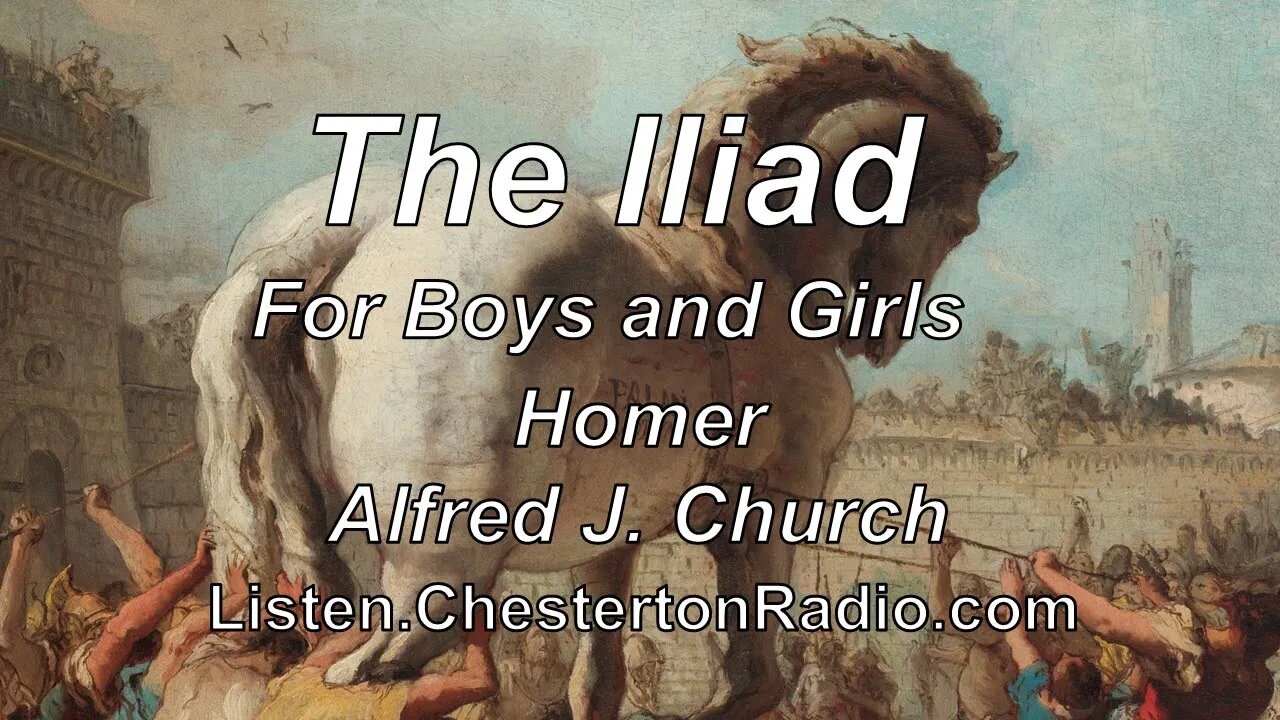Premium Only Content

The Iliad - Homer - Alfred J. Church
Alfred J. Church wrote many books looking at classical literature, but is especially well known for his re-telling of classic books in a style so that younger readers may follow the story. The Iliad for Boys and Girls is a retelling of Homer’s Iliad, centred around the events of the siege of Troy during the final year. (Summary by Lizzie Driver)
1. How the War with Troy Began
2. The Quarrel
3. What Thetis Did for her Son
4. The Duel of Paris and Menelaus
5. How the Oath was Broken
6. The Great Deeds of Diomed
7. Concerning Other Valiant Deeds
8. Of Glaucus and Diomed
9. Hector and Andromache
10. How Hector and Ajax Fought
11. The Battle on the Plain
12. The Repentance of Agamemnon
13. The Embassy to Achilles
14. The Story of Old Phoenix
15. The Adventure of Diomed and Ulysses
16. The Wounding of the Chiefs
17. The Battle at the Wall
18. The Battle at the Ships
19. The Deeds and Death of Patrocius
20. The Rousing of Achilles
21. The Making of the Arms
22. The Quarrel Ended
23. The Battle at the River
24. The Slaying of Hector
25. The Ransoming of Hector & The End of Troy
The Iliad is an ancient Greek epic poem in dactylic hexameter, traditionally attributed to Homer. Usually considered to have been written down circa the 8th century BC, the Iliad is among the oldest extant works of Western literature, along with the Odyssey, another epic poem attributed to Homer, which tells of Odysseus's experiences after the events of the Iliad.
Set during the Trojan War, the ten-year siege of the city of Troy (Ilium) by a coalition of Mycenaean Greek states (Achaeans), it tells of the battles and events during the weeks of a quarrel between King Agamemnon and the warrior Achilles.
Although the story covers only a few weeks in the final year of the war, the Iliad mentions or alludes to many of the Greek legends about the siege; the earlier events, such as the gathering of warriors for the siege, the cause of the war, and related concerns, tend to appear near the beginning.
Then the epic narrative takes up events prophesied for the future, such as Achilles's imminent death and the fall of Troy, although the narrative ends before these events take place. However, as these events are prefigured and alluded to more and more vividly, when it reaches an end, the poem has told a more or less complete tale of the Trojan War. (Wikipedia)
Do you enjoy the variety on Chesterton Radio?
Like, Share and Subscribe to be notified of our new shows
All our shows in one Playlist!
http://Player.ChestertonRadio.com
Easy direct link to our Channel:
http://Listen.ChestertonRadio.com
Discover new Chesterton Radio shows in our other Playlists!
http://Plays.ChestertonRadio.com
http://Chesterton.ChestertonRadio.com
http://Orthodoxy.ChestertonRadio.com
http://EverlastingMan.ChestertonRadio...
http://Eugenics.ChestertonRadio.com
http://Distributism.ChestertonRadio.com
http://FatherBrown.ChestertonRadio.com
http://Freedom.ChestertonRadio.com
http://1984.ChestertonRadio.com
http://Jukebox.ChestertonRadio.com
Follow us on Social Media
https://mstdn.social/@ChestertonRadio
https://www.gab.com/chestertonradio
https://mewe.com/i/chestertonradio
https://chestertonradio.locals.com/
Please consider supporting us.
https://www.patreon.com/ChestertonRadio
Visit the Chesterton Radio Shop
http://Shop.ChestertonRadio.com
-
 18:12:15
18:12:15
Chesterton Radio
1 year ago $4.09 earnedChesterton Radio Live - Christmas Mystery-Drama-Adventure-Comedy - Chuck the TV & Discover a Whole New World!
17.3K2 -
 58:39
58:39
BibleTeacher
3 years agoZOMBIE CHURCH
75 -
 0:18
0:18
Gatlinburg
3 years agoOld Baptist Church
95 -
 1:33
1:33
WFTX
3 years agoChurch live shot 2
58 -
 0:45
0:45
PastorMikeCurry
3 years agoChurch Foxes
53 -
 0:29
0:29
PastorMikeCurry
3 years agoChurch Bear
34 -
 50:15
50:15
daniellesmithab
1 day agoKick-Starting Careers for Young Albertans
34.4K2 -
 39:01
39:01
Stephen Gardner
19 hours ago🔥This Will Leave You FURIOUS... What’s Really Going On?
95.2K152 -
 19:33
19:33
DeVory Darkins
21 hours ago $15.25 earnedBREAKING: Charlie Kirk's shooter in custody after making chilling confession
57.2K171 -
 2:12:43
2:12:43
TimcastIRL
15 hours agoErika Kirk Addresses Public After Charlie Kirk Assassination, Live Coverage | Timcast IRL
455K465